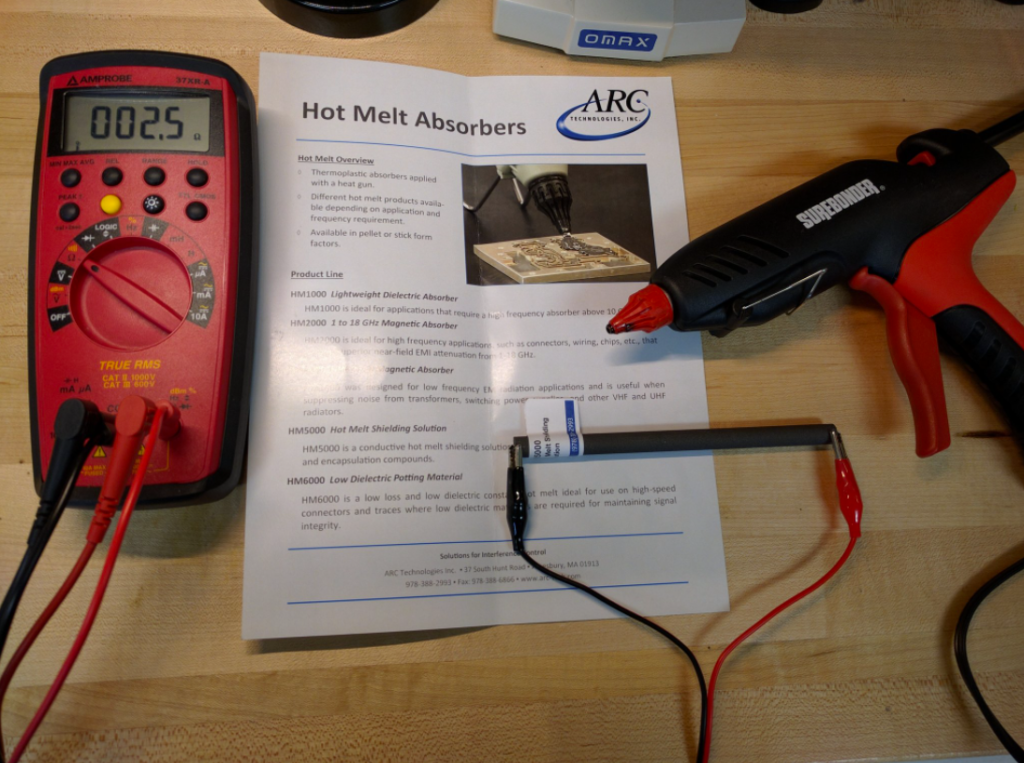Hot glue is a common adhesive that is often used in crafts and repairs. Many people believe that hot glue is not conductive, but this is not always the case. Hot glue can be a conductor if it is applied in a way that allows the metal to touch the hot glue.
Yes, hot glue is conductive. It’s not the best conductor, but it does have some electrical properties. This means that it can be used to create electrical circuits, but it’s not recommended for high-powered applications.
Is hot glue conductive? If not, what is the best conductive glue? We’ll answer all of your questions here.
Table of Contents
Can Electricity Pass-Through Hot Glue?

Electricity is a type of energy that travels through wires to power lightbulbs, televisions, and other appliances. Electricity is also used to create sparks when you weld or solder metal. Can electricity pass through hot glue?
The answer is yes, electricity can pass through hot glue. However, the amount of current that can flow through the glue depends on the thickness of the glue and the voltage of the electrical current. If you are using a high voltage current, there is a greater chance that the electricity will jump across the gap in the glue and cause a spark.
Hot glue is often used to hold wires together because it is an insulator. This means that it prevents electricity from flowing through it. However, if there is a break in the insulation, then electricity can flow through the glue and cause a spark.
Uses for Conductive Hot Glue

Hot glue is a type of adhesive that is applied in liquid form and then solidifies as it cools. It is often used to bond materials together and can be melted using heat or a hot glue gun. There are many different types of hot glue, each with its own set of characteristics. Some hot glues are conductive, which means they can be used to create electrical circuits.
Conductive hot glue has a range of applications in electronics. It can be used to create connections between components or to create antennas and other electrical structures. It can also be used to fix broken electronic devices. Because it is conductive, it can help to distribute electricity evenly across a circuit, which can improve the performance of the device.
Conductive hot glue is also useful for prototyping new electronic circuits.
Advantages of Conductive Hot Glue
Here are some of the main benefits of using conductive hot glue:
1) It’s very easy to use. Simply apply it to the surface you’re repairing and wait for it to dry.
2) It’s very strong and durable. Conductive hot glue will hold your repairs firmly in place, ensuring they don’t come loose over time.
3) It’s a great conductor of electricity. This makes it perfect for repairing electrical components.
4) It’s non-toxic and safe to use around children and pets.
Disadvantages of Conductive Hot Glue
There are several disadvantages to using conductive hot glue.
- First, it is not as strong as traditional glue, so it can easily be pulled apart or damaged.
- Second, it is less durable and can break down over time.
- Third, it is not as effective at conducting electricity as other materials like metal or copper.
- Finally, it can be messy and difficult to work with.
How to Make Hot Glue Conductive

Hot glue is not the most conductive adhesive out there, but with a few simple tricks, you can make it work just fine for your project. One way to make hot glue more conductive is to add a small amount of silver or copper powder to the glue before you use it.
This will help the glue carry an electric current better. Another way to improve the conductivity of hot glue is to preheat it before you use it. This will help break down some of the molecular bonds in the glue, making it more conductive.
Finally, if you need to bond two pieces of metal together, using hot glue as an adhesive can be a good option. The metal will create a circuit through the hot glue, allowing electricity to flow between the two pieces.
Read Also: Is Super Glue Conductive
FAQ About Is Hot Glue Conductive
Is Hot Glue OK for Electronics?
Hot glue is not typically recommended for use with electronics. The adhesive can cause short circuits and other damage to sensitive components. However, if you are careful and take precautions, it is possible to use hot glue with some electronics projects. Always test your project in a safe environment before using it in a more critical application.
Can Hot Hot Glue Cause Short Short Circuits?
Yes, hot glue can cause short circuits. If it gets on electrical wiring or other electronic components, it can create a conducting path between two points that should be electrically isolated. This can cause a short circuit, which can lead to overheating and potentially damage the component or even start a fire.
Is Hot Glue Electrically Conductive?
Yes, hot glue is electrically conductive. It’s not the best conductor, but it will allow electricity to flow through it. This means that it can be used to create electrical circuits, but it’s not recommended for high-voltage applications.
Is Hot Glue Stick Conductive?
Yes, hot glue sticks are conductive. This makes them a great choice for quick and easy repairs to electrical cords and other electronic devices. However, they should not be used as a permanent fix, as they are not as durable as other types of adhesive.
Is it Safe to Hot Glue Wires?
Yes, it is safe to hot glue wires. However, you should use caution when doing so, as the heat from the glue can cause the wires to melt.
Can Hot Glue be Used on Electrical Connections?
Yes, hot glue can be used on electrical connections. It is important to use caution when using hot glue on electrical connections, as it is easy to accidentally create a short circuit.
Can you Use Hot Glue Instead of Soldier?
Yes, you can use hot glue instead of solder in some cases. Hot glue is not as strong as solder, so it is not always a good substitute.
Can a Hot Glue Gun Set Off a Fire Alarm?
Yes, a hot glue gun can set off a fire alarm. The high temperature of the glue gun can cause the alarm to go off.
Can Hot Glue Guns Catch Fire?
Yes, hot glue guns can catch fire. They work by heating up a small metal tip, which then melts the glue. If the gun is not used properly, or if there is something blocking the airflow, it can overheat and start a fire.
Final Thought
Hot glue is not a conductor of electricity. While it is not advisable to use it in place of traditional soldering methods, it can be used as a temporary fix in a pinch. Always be sure to use caution when working with hot glue, as it can cause burns.
In conclusion, hot glue is not a conductor of electricity. This means that it can be safely used to create electrical circuits without fear of shorting out the circuit or causing a fire. It is also non-toxic, making it a safe choice for crafting and other projects.
Relevant Resources:




